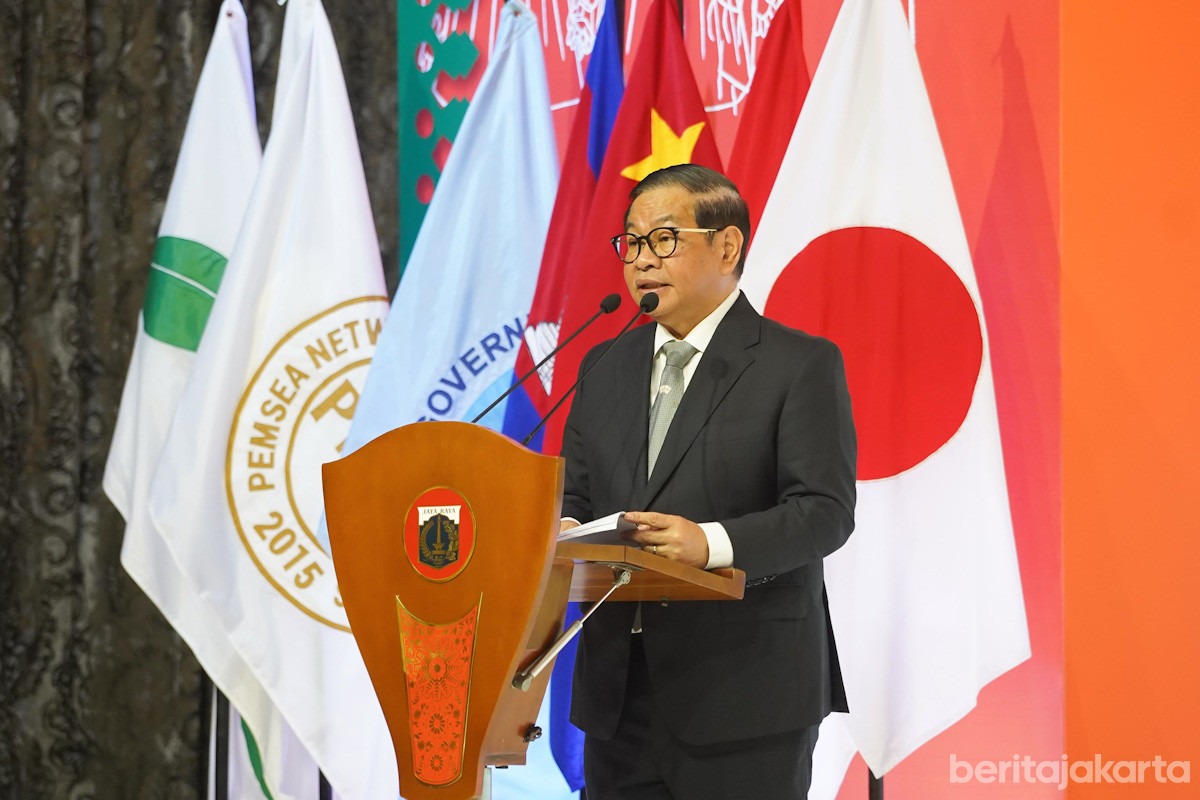

Tuesday, September 16th 2025 Reporter: Dessy Suciati Translator: Maria Inggita 832

(Foto: Reza Pratama Putra)
Jakarta Governor Pramono Anung emphasized the Jakarta's strategic roles in developing a blue economy model that balances economic growth with protection of marine and coastal ecosystems.
"Jakarta plays an important role in developing a blue economy model,"
Jakarta itself has a coastline stretching 272 kilometers and 113 small islands.
He made this statement while attending the Partnerships in Environmental Management for The Seas of East Asia (PEMSEA) Network of Local Governments (PNLG) Forum 2025 at Hotel Indonesia Kempinski, Central Jakarta, on Tuesday (9/16).
"With the resources it has, Jakarta plays an important role in developing a blue economy model," he asserted.
Although facing challenges such as rising sea levels, land subsidence, flooding, and marine pollution, Jakarta sees great potential in renewable energy, sustainable fisheries, ecotourism, and coastal resilience programs.
Pramono stated that this year's forum theme, "Towards a Sustainable and Inclusive Blue Economy: Linking Climate, Nature, and Energy", aligns with Jakarta's development priorities.
"Our vision is to establish Jakarta as a global coastal city contributing to regional and global sustainability," he mentioned.
He believes that linking climate action, nature conservation and energy transition is key to building resilience and inclusivity in coastal communities.
To realize that vision, Jakarta has implemented a number of policies including Integrated Coastal Management (ICM). Pramono explained that Jakarta has adopted ICM as the primary framework for managing its coastlines and islands.
"We address flooding and tidal flood through coastal defenses, ecosystem restoration, and community-based adaptation measures," he shared.
Additionally, Jakarta is pursuing blue carbon policies and ecosystem restoration in the Thousand Islands by restoring mangroves and coral reefs, thereby protecting biodiversity while supporting climate change mitigation through carbon sequestration.
Jakarta is also working to empower coastal communities by supporting sustainable fisheries, aquaculture, ecotourism, and sea-based small and medium enterprises, promoting inclusive economic growth that benefits local residents.
"We are actively involved in international collaboration that brings in new innovations and ideas," he added.
Furthermore, he noted that in 2025, Jakarta is participating in the Student Reinventing Cities Competition organized by C40 to transform abandoned areas into sustainable green spaces.
This project involves students designing eco-friendly solutions for the area around the Onrust Archaeology Museum. This aligns with the Jakarta Provincial Government's goal to develop Onrust Island as an educational tourism destination.
"This is not merely about winning, but about collaboration and finding the best solutions for the community, with the aim of restoring a historic island as a meaningful and sustainable model for the future," he said.
In this forum, Pramono also announced the launch of State of the Coast (SOC) Jakarta 2025. This document serves as a roadmap toward Jakarta's vision of becoming a sustainable global maritime city.
Pramono stated that the PNLG forum provides a vital platform for local governments to share knowledge, exchange best practices, and strengthen cooperation toward a sustainable blue economy.
"We understand that no city or country can achieve this goal alone," he mentioned.
Achieving this vision requires collaboration among government, academia, civil society, and private sector. Pramono hopes the forum will result in real commitment and collective action.
"Jakarta wants to show that even a megacity can protect its coasts, empower its citizens, and promote sustainable maritime development," he asserted.
On the other hand, Minister of Environment, Hanif Faisol Nurofiq, said he was proud that Jakarta is hosting this year's PNLG forum. He remarked that the gathering is especially important amid challenges in preserving marine ecosystems from threats like climate changes, pollution, and unsustainable exploitation.
"The theme of this year's forum, 'Towards a Sustainable and Inclusive Blue Economy: Linking Climate, Nature, and Energy,' is an urgent call to action," he mentioned.
Hanif pointed out that while the blue economy supports economic growth through marine resources, it must be rooted in environmental responsibility. He also stressed that inclusivity is essential for its long-term viability.
"True sustainability must uplift the welfare of all coastal communities, especially traditional fishermen and local residents," he emphasized.
On this occasion, he delivered his gratitude to Governor Pramono and the Jakarta Provincial Government for their efforts in addressing the threats facing the city's water areas.
"I thank the Governor and everyone in Jakarta for managing our water areas. Since we are an archipelagic country, this is very important,” he said.